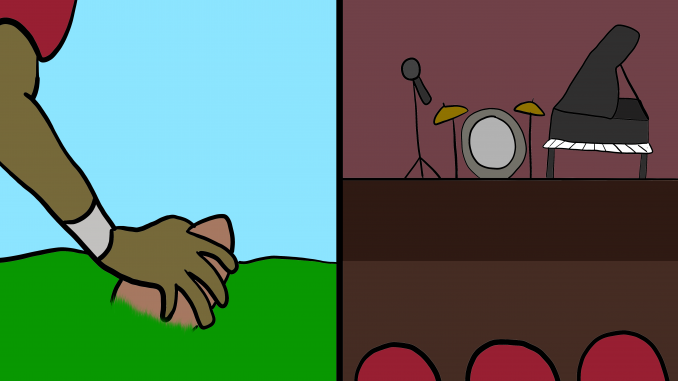
As the COVID-19 pandemic worsens, Philadelphia’s concert halls and theaters will remain empty through the rest of 2020, which means that with nowhere to safely perform in person, music artists will continue to struggle to stay afloat.
Public and private indoor gatherings of any size between members of different households in Philadelphia will be banned until at least Jan. 1, the city announced Monday, The Temple News reported.
The Mann Center, an outdoor venue in Fairmount Park, cancelled the remainder of its 2020 concert season, the Philadelphia Inquirer reported.
With the federal government stuck at an impasse regarding another stimulus deal, music artists have been finding creative ways to earn revenue by playing virtual shows, selling merchandise or releasing new albums.
It is uncertain when it will be safe to relax restrictions on events like concerts and art exhibits, so students should find alternative ways to support local artists and their peers in the Boyer College of Music and Dance, School of Theater, Film and Media Arts and Tyler School of Art and Architecture as they virtually showcase their work during the upcoming months.
Small artists and their contributions to communities should not be taken for granted during the COVID-19 pandemic, said Hannah Reiniger, a freshman theater major.
“Similar to sporting events, theatrical events are very important to the community, and we need to be integrating them back into society again,” Reiniger said.
Throughout October, Reiniger participated in a Genesius Theater production of the Rocky Horror Picture Show that was performed outdoors in Reading, Pennsylvania. Those who attended the show were seated six feet apart and were required to wear a mask upon entry, Reiniger said. Attendees were then allowed to remove their masks once they had been seated.
“The show definitely helped me, at least mentally, to feel like things were a little bit more normal,” Reiniger said.
In Pennsylvania, creative industries suffered the loss of more than 97,000 jobs and $4.4 billion in sales between April and July alone. Nationwide, non-profit arts lost roughly $13.1 billion by mid-September, The Times reported.
Lora Sherrodd, a first-year jazz voice master’s student, feels the strain of COVID-19 restrictions on her life as a student musician.
“There’s a huge community aspect when you’re just walking around in the music building and you see someone in the practice room and you just say ‘Hey man, can we play?’ and that’s just not possible anymore,” Sherrodd said.
Although Sherrod felt pandemic restrictions have limited her opportunities to learn and perform as a musician, she is optimistic about artists’ ability to adapt.
“That’s the cool thing about 2020,” Sherrod said. “You’re not playing for an audience, but we have the technologies to be able to make music and play together still.”
Sherrod also advised students and other fans to interact with their favorite artists on social media, stream their content from home and, if it is financially feasible, try purchasing artists’ content along with engaging with them digitally.
“If you see one of your musician friends post a video or a recording or something like that, and you think ‘Oh that’s cool,’ comment that,” Sherrod said. We want to see people engage with our content, and if you can share it or like it or comment, those help us out a lot.”
Amelia Martinez, a third-year dance master’s student, echoed Sherrod’s advice for fans to interact with small artists online.
“There’s a lot of other ways you can support, either by social media following or engaging in conversation with them,” Martinez said. “I think that’s really what a lot of artists want, to communicate something.”
COVID-19 has brought on feelings of grief and loss for many, as most students are currently in the midst of one of the worst disasters to occur in their lifetimes.
Artists’ work often provides others with an avenue for processing trauma, so we should do everything in our power to help out performers who may be struggling.
In harrowing times such as these, many turn to the arts to express their emotions, Martinez said.
“Sometimes it takes that kind of out-of-body experience of seeing somebody else processing their emotions for you to really understand, ‘Yeah, that’s what I’m feeling right now,’” Martinez added.
The show must go on. Losing the arts would be yet another tragedy of the COVID-19 pandemic that no one is prepared to face.


Be the first to comment